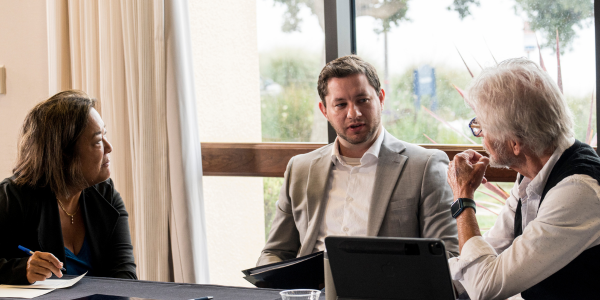
Understanding Local Gov Basics and how to be Involved in Your Local Government & Community
Originally created in partnership with the California Association of Realtors for
their membership; this valuable webinar series is perfect for other civic minded organizations.
Local governments and communities coexist in a unique relationship that, when healthy,
can lead to successful partnerships and projects. However, it is not always easy to
understand how local government works, where the funding comes from, what the major
issues are, and how you, as a community member, can get involved. In this dynamic
online program, which can be delivered as a professional certificate if desired, the
Davenport Institute team will guide you through a deep dive into local government
basics, funding, the relationship between community and local government, hot-button
issues, and ways to get involved in your local government and community.
Which groups & organizations can benefit from this program?
This program can be available as a custom training in partnership with your organization
for your members and/or community members. The curriculum offers outstanding and practical
information for the natural community leaders in your organization.
This program is a good fit for organizations such as:
- Chambers of Commerce and other business associations
- Community Based organizations (CBOs)
- Non-profit organizations
- Non governmental organizations (NGOs)
This program can also serve as a citizen’s academy for smaller local government agencies
or as a starting point to develop your own.
What is Covered in the Program
Over six intensive and action-oriented weeks, you will have the opportunity to:
Local Gov Basics
The nature of government may appear very simple on the surface: taxes are collected
and services are provided in return. While technically true, the reality is much more
complex—particularly in a state as large and diverse as California. With different
forms of city government existing within county and regional structures, there is
much to unpack in learning how government actually works. This session will cover
the who, what, when, where, and how of local government. Participants will leave with
an understanding of how different levels and areas of government function, as well
as the role of community-based organizations in the policy development process.
Local Gov Revenue Systems: Understanding How Municipal Government is Funded
While municipalities have always relied on tax revenue, the specific structure and
sources for funding have evolved over time. From changes in property taxes and the
creation of special financing districts to the use of bond measures and increasing
financial obligations for cities, there are many moving parts when it comes to funding
local government. This session will explore the various sources of revenue for local
governments, how new funding can be secured, and where funds are allocated in most
municipalities. We will also cover how changes at the state level have reshaped housing,
land and property use, education funding, and more.
Hot Button Issues in Local Government: From Homelessness to Environmental Policy
In an era that is increasingly distinguished by polarization and distrust, we face
complex challenges that require us to move past our tribal tendencies. Housing, homelessness,
climate change, budgets, and representation are just some of the issues that local
governments are currently facing. While cities are on the frontlines of addressing
these various problems, the larger picture necessarily includes collaboration between
counties, regions, and states. In this session, participants will learn the characteristics
of “hot button” issues, the sources of distrust, the biggest issues facing our communities,
and how we can overcome partisanship and find solutions.
The Dialogue between Local Government and Community
Strong communities are built through effective public engagement that employs the
right kind of dialogue for each situation. Between local government and the community,
there are various types of dialogue that take place, each serving a particular purpose.
In order to be effective advocates as community members, we must understand the different
types of dialogue to determine which will be the best avenue for what we seek to achieve.
This session will explore the spectrum of engagement from the perspective of the community
member through dialogue. Participants will leave with an understanding of the various
ways in which they can reach their local government and how to be an effective advocate
for community needs.
Getting Involved in your Local Government & Community
Similar to a spectrum of public engagement from the perspective of local government,
there exists a spectrum of community participation. As community members, we have
the option of engaging at a minimum or maximum level and there are various factors
that contribute to that decision making process. What are the options for us as community
members at each end of the spectrum, and everything in between? What should I be considering
as I prepare to get involved? What should I expect? This session will provide a deep
dive into the many ways that you can get involved in your local community and engage
with your local government.
Considering Running for Local Office: Where Do I Begin?
Running for public office can be a very intimidating process that discourages many
citizens from even attempting, particularly because of the legal, financial, and personal
requirements that come with campaigning. Understanding the legal requirements, candidate
qualifications, fundraising needs and limitations, community demographics, and other
factors is challenging, but necessary for anyone considering running for office. From
school board and sheriff to city council and the state legislature, this session will
cover everything you need to know when deciding if, when, where, and for what office
you should run.
Looking for more information?
Contact Davenport Institute via email at davenport.institute@pepperdine.edu.
